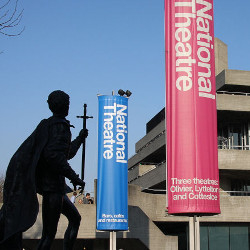Nicholas Hytner: National Theatre is 'ever more dependent on the generosity of its supporters'

Ten years ago, when I became
director of the National Theatre,
I was plunged into a fascinating
and lively debate about the
purpose of tax payers’ investment
in the arts. The Labour
government had become
increasingly instrumental in its
vision for the arts and expected,
in return for its funding,
measurable outcomes in the
diversity of our audiences, in our
educational outreach and in the
social benefit of our activities.
I, like most of my colleagues,
had some sympathy for the then
government’s aspirations. Arts patronage has never come
without strings, and the demand
that we should be as inclusive and
accessible as possible seemed
preferable, for instance, to the
glorification of the Medicis or the
worship of Joseph Stalin.
However, it felt necessary in
2003 to push back against what
felt like an increasing tendency to
assess the artistic experience
purely on the basis of the makeup of its audience, and many arts
leaders and practitioners
rediscovered the case for the arts
based on their inherent worth.
Our conversations with government
were productive, and many of the wilder
excesses of instrumentalism disappeared.
Successive Secretaries of State seemed very
comfortable to talk about the arts as valuable
in themselves, and central to a civilised
society. It did not seem in those days that it
would become necessary once again to fight
for the very idea of government funding.
Over recent months, we have been asked by
government to make a case for the arts based on
the benefits they bring to the economy. Since
this seemed like the only game in town, my
colleague Nick Starr and I made the case in an
article in the . We pointed out
that, according to a recently published report by
Nesta, the creative economy employs 2½ million
people in this country and is 10% of the overall
economy; growth in employment in the creative
sector runs about four times the average. Growth
in the UK is going to rely on innovation; we
have a highly interlinked creative economy of
which, almost uniquely in international terms,
the arts and culture see themselves as a part.
War Horse started as an experiment in our Studio. We spent about £50,000 on its development, and about £500,000 putting it on. In the last
four years it has made the NT £11m. The lesson
is not to ask the question, how do we create
the next War Horse? It is rather to continue
funding the NT Studio where much of the most
commercially successful stuff starts life. This is
why the West End has largely outsourced its need
for the new to the subsidised sector, as essential
to their business model. They can’t see how you
would otherwise develop a Matilda or a Curious
Incident of the Dog In the Night-Time. The director and nearly all of the cast of the recent
James Bond movie Skyfall (which took over a
billion dollars at the box office internationally)
are alumni of the subsidised theatre. Tate Modern
attracted 5.3 million visitors last year, many of
them tourists attracted to Britain by our arts and
heritage. And although we balk at describing
Shakespeare as Britain’s leading brand in the rest
of the world, it wouldn’t be untrue. We declared
ourselves ready to help the Secretary of State
develop a policy that genuinely recognises the
return on systematic investment in the arts.
Whether or not our argument was thought to
be persuasive, the threatened 10 or 15% cut to
arts investment in the most recent spending
round failed to materialise, and the Chancellor’s
5% cut was greeted with some relief. In the
context of current government policy, it would
perhaps be churlish to point out that by 2015-
16 the Arts Council will have been cut by
35% in real terms since 2010. But it can’t be
denied that we are entering very perilous times,
particularly outside London where individual
and corporate giving has yet to make anything
like the kind of impact that it has in the capital.
The National Theatre must now become
ever more dependent on the generosity of its
supporters. It is our phenomenal good fortune
that we have such committed and generous
individual donors, corporate sponsors and
supportive trusts and foundations. Without
their help, our repertoire would have shrunk,
our outreach would be a fraction of what it
is, and the work we do outside of our three
theatres – through our Learning department and
at our Studio – would be under severe threat.
I could not be more grateful to all of them,
and we are all aware how much more asking
we will have to do over the coming years.
Under these circumstances, it may be necessary
to go back to basics in the argument we make
for ourselves. No matter how economically
productive we are, no matter how much
value we provide educationally, no matter
the strength of our work in bringing together
the widest possible audience – in the end, we
work here and you come here because we all
believe that the theatre is transformational
in itself. It challenges, it inspires, it elevates, it
educates, and it enlarges the spirit of everyone who wants to make it part of their lives.
This statement is reprinted with kind permission from the National Theatre's annual report 2012-13










